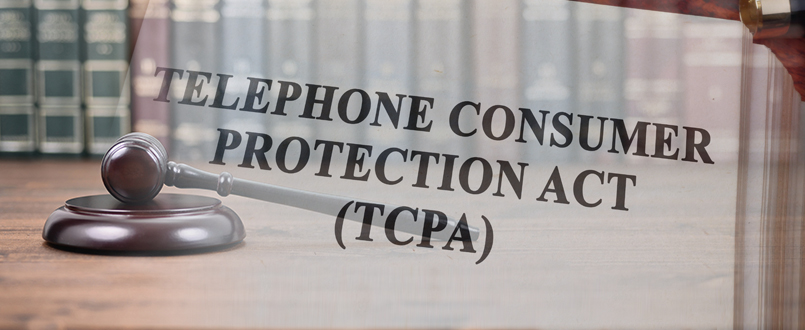
Protect Against TCPA Violations, Penalties, Fines & Lawsuits
By Contact Center Compliance on Mar 4, 2024
What is the Telephone Consumer Protection Act (TCPA)?
The year was 1991. Cellphones were still rare, a novelty to most people. The most pressing telecommunications issues for many average Americans were getting interrupted at dinner by annoying telemarketing calls or watching their office fax machine spit out pages and pages of unsolicited advertisements. Something had to be done, and that something was the Telephone Consumer Protection Act (TCPA).
The TCPA statute was created to address a growing volume of nuisance phone calls received by consumers. The statute restricts the use of automatic dialing technology and pre-recorded voice messages from telemarketers, debt collectors, and many other industries. The restrictions cover both calls and texts, and both cell phones and landlines. Even certain business-to-business calls are restricted, such as calls to business cell phones. The TCPA also restricts unsolicited faxes.
The TCPA is interpreted and enforced by the Federal Communications Commission (FCC). The TCPA contains a private right of action, opening the door for consumers to bring individual or class action lawsuits for both TCPA and autodialer violations.
Main Provisions of the TCPA Law (the Rules & Regulations)
The TCPA prohibits businesses from calling any number that appears on the state or Federal Do Not Call (DNC) lists established by the law, as well as their own internal lists of customers who have requested not to be called. It also restricts the use of robocalls and automatic dialers.
The main provisions of the TCPA include:
Call Time Restrictions
To prevent unwanted phone calls from disturbing people’s sleep, companies are only allowed to contact residential consumer between 8:00 AM and 9:00 PM in the recipient’s local time zone.
Automatic Telephone Dialing Systems (ATDS)
The TCPA restricts autodialed marketing calls to cellphones and other devices (including VoIP phones) where the recipient might be charged for the call. Companies must obtain prior express written consent to place autodialed marketing calls to these lines.
Robocalls
Artificial and prerecorded voice calls cannot be made to residential landlines or wireless numbers for marketing purposes, unless prior express written consent has been obtained.
Identification Requirements
Callers must identify themselves to recipients. Among other information, the TCPA requires callers to provide their name, the name of the company on whose behalf they are calling, and a telephone number or address which can be used to contact them.
National DNC List
Companies making marketing calls or sending texts to consumers are required to suppress phone numbers on the National Do Not Call Registry. Keep in mind that some states have their own DNC lists, as well, in addition to the federal database.
Internal DNC List (Opt-Outs)
Companies are required to maintain an internal DNC list of consumers who asked not to be called or texted. Companies should honor those requests immediately.
Private Right of Action
This provision allows individuals, not just governmental organizations, to bring TCPA lawsuits directly against the violators and obtain up to $500 per violation or up to $1,500 per willful violation.
The Impact of the TCPA on Businesses
There are three avenues for businesses to be impacted by litigation premised on TCPA violations.
First, we have litigants who are simply trolling for any kind of TCPA violation and threatening to put forth a claim. Legally speaking, this might not be blackmail, but it sure looks like it. These litigants will approach the company before they file any suit and try to convince them to settle out of court prior to any formal hearings. Their goal isn’t to go to court, but to get the company to pay them to go away. These litigants usually target small businesses such as mom-and-pop stores that don’t have deep pockets or expert legal teams.
Next are the individuals who actually file lawsuits. Mid-size to enterprise-level companies are the usual targets. These litigants aren’t going for a quick payoff, they’re trying to win formal awards of compensatory fines for TCPA violations. These claims can take up considerable time and resources from defendants.
Lastly, the biggest danger of violating TCPA regulations is the class action lawsuit. This is the worst possible outcome, with potentially hundreds of millions of dollars at stake. The litigants that launch these cases are going after damages for every customer that might have been affected by your TCPA violations, but those customers often only get a small portion of the payout—much of it goes to the lawyers. Class action lawsuits often target enterprise-level companies that have big cash reserves but have been filed against many small and mid-size companies, as well.
Damages Under the TCPA
Multimillion-dollar settlements are not uncommon. One of the most infamous TCPA settlement occurred in August 2014, when Capital One agreed to pay $75.5 million to end a class action suit that arose from their use of an autodialer to call customers’ cell phones. As costly as that was, it’s only one of many large TCPA settlements.
Here are some others:
- Dish Network: $61 million in June 2017
- Caribbean Cruise Line: $76 million in September 2016
- US Coachways: $50 million in March 2018
- Wells Fargo: $30.4 million in February 2017
While the sheer dollar amount of these damages is worrisome enough, there are other ways that TCPA violations can harm a business. Defending against claims, even invalid ones, will cost substantial legal fees. Any time spent dealing with TCPA issues distracts companies from their core competencies and use up internal resources. Worst of all, TCPA suits can bring unwanted negative publicity that damages brands and harms business relationships with customers.
How to Minimize TCPA Exposure
You’ll want to identify and avoid the litigators and professional plaintiffs that may already be lurking in your customer databases. Compile lists of phone numbers belonging to litigators and plaintiff’s attorneys who have filed TCPA complaints in the past, and scrub against it on a regular basis—new cases are filed every day.
Don’t forget to check for reassigned numbers, too. When a phone number is reassigned from one person to another, any consent you’ve obtained for contacting that number becomes invalid. Identifying reassigned numbers in your database is critical for TCPA compliance.
Identifying wireless and VoIP numbers is also important. Obtaining the required prior express consent starts with knowing which numbers require it.
Finally, make sure that the language on consent forms is clear and that you have it well-documented. You should include a robust, legally-vetted arbitration clause stating that customers agree to go into arbitration and are not allowed to enter into a class action lawsuit if any dispute arises about the services provided under your terms and conditions. These clauses can and often do successfully stop class action lawsuits.
Wireless and VoIP Numbers
In the early days of cell phones, users were charged in a pay-per-minute structure, even for received calls. As soon as you made that wireless connection, the meter started ticking, no matter who was on the other end or why they were calling.
Nowadays we have unlimited calling plans, but the TCPA legislation still protects wireless numbers from autodialed calls.
There used to be prefixes that would signify wireless numbers, making it easy to distinguish cell phones from landlines, but numbers are transferred so frequently today that identifying wireless numbers is much more complicated.
According to court opinion, the TCPA treats certain VoIP numbers the same as wireless numbers. Therefore, the legal precedent is that the same restrictions and consent requirements for wireless numbers apply to VoIP numbers Direct marketers must be vigilant about identifying VoIP numbers and scrubbing their call lists to remove them.
How to Avoid Wireless/VoIP Violations
Difficult though it can be, the key to staying compliant with these regulations is to accurately identify wireless and VoIP numbers before loading them into an automatic dialer or doing any other kind of calling or messaging.
You must know the level of consent you’re required to have for the numbers on your list and the types of communications you want to have with them.
TCPA Consent
The TCPA primarily recognizes two kinds of consent:
- Prior Express Consent, which is not specifically defined in the statute, but should consist of an agreement (written or oral) clearly indicating consent to receive calls at a particular number. For non-marketing calls, if a consumer knowingly provides a phone number to a company without conditions in the normal course of doing business, the express consent is implied—so long as the content closely relates to the purpose for which the number was originally provided.
- Prior Express Written Consent, which the FCC defines as a written agreement between the caller and the recipient of the call that clearly authorizes the caller to deliver “advertisements or telemarketing messages using an automatic telephone dialing system or an artificial pre-recorded voice.” This type of consent must specify the phone number to be called and must also include the recipient’s written or electronic signature. The caller must also disclose that consent is not a condition of purchase.
Prior express written consent is required any time you send a marketing message to a wireless or VoIP number using an ATDS. And for text marketing, court opinion has consistently held that, under the TCPA, a text message is the same as a call. While the Supreme Court’s decision in Facebook v. Duguid has introduced some doubt as to which texting platforms—if any—should be considered autodialers, these prohibitions would still be in force if a particular device were found to be an autodialer.
Reassigned Numbers
You must have consent to call both the individual and the phone number. So, if you have consent to contact a phone number and that number is reassigned to another person, that consent is no longer valid. Of course, this creates a difficult situation in which companies can find themselves calling numbers that they did not know had been reassigned, committing TCPA violations in the process.
Previously, the FCC had made some allowances for this circumstance with a one-call safe harbor for reassigned numbers. In 2018, the D.C. Circuit court’s ruling in ACA International v. FCC struck down this safe harbor, finding it “arbitrary and capricious.” The FCC has announced that it will create a Reassigned Number Database, with an attending safe harbor rule for callers who regularly scrub their numbers against this database. However, the actual creation of the database has been delayed twice and has not yet been completed.
How to Avoid Reassigned Numbers Violations
To minimize exposure to a TCPA violation or lawsuit, you need a reassigned number solution, including using the right products or data sets to scrub your list against those numbers.
In particular, you need a reassigned number solution for managing this interregnum between the D.C. court vacating the one-call safe harbor and the forthcoming creation of the FCC Reassigned Number Database.
How to Protect Your Business Under the TCPA
For businesses that make a lot of marketing calls or other outbound communications, staying in the good graces of the TCPA can be a lot of work. Here’s a brief rundown of the most important ways to protect your business:
-
Familiarize yourself with the provisions of the TCPA listed above and comply with them
-
Identify and avoid litigators and professional plaintiffs who file class action lawsuits—they may already be in your CRM database! Compile a list of individuals and attorneys who have been involved in TCPA lawsuits and scrub your contact list against it regularly
-
Check for reassigned numbers to the best of your ability—removing reassigned numbers from your call list is one of the trickiest parts of TCPA compliance, but it’s also one of the most important
-
Identify wireless and VoIP numbers whenever possible in order to determine the type of consent you are required to have obtained for them
One last suggestion—make sure that the wording on your consent forms and documentation is clear and understandable. You should include a legally-vetted arbitration clause that states that your customers agree that if there is any dispute over the services provided under your terms and conditions, they will submit to arbitration and cannot enter into any class action lawsuits.
Every direct marketer should make sure to do this. These clauses can—and do—stop class action lawsuits from going forward.
Conclusion: The Right Experts with the Right System
If you’re worried that professional TCPA litigators might be hiding out in your customer database, or if you’re having trouble keeping up with all of the relevant provisions required to cleanse a particular list, there’s a good chance you’d be well-served by an expert solution.
The right specialists, utilizing solutions flexible enough to fit seamlessly with your existing internal processes, can transform your business and eliminate the distractions that can result in costly violations or lawsuits, thus freeing you to focus on the things your business does best.
At Contact Center Compliance, we deploy an advanced do not call scrubbing tool called DNC Scrub® that includes Litigator Scrub®, an award-winning, cloud-based defense against serial TCPA litigators and professional plaintiffs. This solution encompasses all of the legislative compliance requirements discussed above, helping our clients eliminate exposure to both TCPA and DNC risk.
Our DNC Scrub® solution includes the right ecosystem and IT resources to fully manage your Federal, state, and Internal DNC scrubs and all TCPA provision requirements in a single job. We offer simple, flexible processes that allow our customers to come to our website and manually upload a list of phone numbers, schedule nightly SFTP jobs, or set up real-time API connectivity. Additionally, you can get real-time updates and increased efficiency from our enterprise-level integrations with platforms you’re already using.
With over 70 billion scrubs performed (and counting) and 0 violations, fines or lawsuits incurred by our clients, you can now market with confidence.
We’re happy to talk more about how we can help you minimize exposure to DNC and TCPA compliance threats. Click here to book time with a friendly compliance expert.



